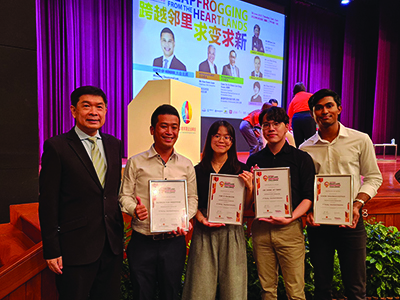Why ITB?
- Gain skills in the latest technologies driving digitalised trade operations to prepare you for in-demand roles in trade, supply chain and marketing
- An industry-relevant curriculum with a strong focus on sustainability to hone skills to address real-world challenges
- Embark on a Signature Overseas Study Trip to a global trade hub to experience first-hand different business practices and cultures!
- Customise your learning: Choose a six-month local/overseas internship + Business Electives NEW! in emerging areas; or the one-year JobReady Programme with renowned companies
About ITB
Ever wondered how multinational companies like Bosch, P&G, LVMH and IKEA manage every step of their global business – from sourcing materials, production, to getting their products to stores around the world? With Singapore becoming a popular regional and global supply chain hub, there is growing demand for professionals in international trade and supply chain management.
With the Diploma in International Trade & Business (ITB), you can set your sights on an exciting career in planning, procurement, trade operations, logistics management and marketing in international companies!
Gain knowledge of international trade markets, supply chain management, trade law and trade finance with ITB! You will also develop digital skills to use the latest technologies such as artificial intelligence (AI) and Enterprise Resource Planning, as well as implement e-procurement, e-commerce, and automation. With these skill sets, you will be able to make data-driven decisions to manage business transformation and risks!
With the growing focus on meeting sustainability targets, companies need talent with green skills. By learning to create sustainable supply chain strategies that align with business goals and gaining expertise in sustainable sourcing, green logistics, and ethical marketing, you will develop skills to build a more climate-friendly trade ecosystem.
Our strong links with industry mean you get to work on integrated and capstone projects with top-notch companies to solve real-world challenges. This will also allow you to gain hands-on experience in managing business transformation initiatives such as digitalisation of operations, improving supply chain resilience, and development of sustainable business strategies.
You will also get to embark on an immersive Signature Overseas Study Trip to an international trade hub! Experience how diverse business practices, geopolitical conditions and cultural differences shape global commerce.
Choose how and what you learn in your final year! Opt for a six-month local/overseas internship together with an industry capstone project and two electives from the brand-new Business Electives Programme; or choose the one-year JobReady Programme for deeper industry
immersion.
Designed to supercharge your learning, the Business Electives Programme focuses on the latest strategic growth areas in business:
- Business Psychology
- AI & Digital Transformation
- Business Sustainability
With our close partnerships with leading multinationals and companies, you will benefit from exposure to a wide range of high-growth sectors – preparing you for in-demand roles in Singapore and beyond!
Highlights
Real-world Application
Award-Winning Business Idea
Further Studies
As an ITB graduate, you can pursue degrees in international trade and supply chain management, as well as other business degree courses at all local and overseas universities.
Careers
With Singapore’s growing role as a global trade and supply chain hub, your job prospects are bright! You can pursue a wide variety of in-demand and supply chain-related careers across diverse sectors.
You can look forward to opportunities in these roles:
- Business Development Executive
- International Business Analyst
- International Business Entrepreneur
- International Marketing Executive
- International Procurement Executive
- Logistics Executive
- Supply Chain Planning Executive
- Supply Chain Risk & Resilience Analyst
- Trade Compliance Officer
- Trade Operations Executive
Entry Requirements
AGGREGATE TYPE ELR2B2-B
To be eligible for consideration, candidates must have the following GCE ‘O’ Level examination (or equivalent) results.
| Subject | 'O' Level Grade |
|---|---|
| English Language | 1-6 |
| Additional Mathematics/Mathematics | 1-6 |
| Any one of the 2nd group of Relevant Subjects for the ELR2B2-B Aggregate Type | 1-6 |
Applicants must also fulfil the aggregate computation requirements for the ELR2B2-B Aggregate Type ( English Language, 2 relevant subjects and 2 other best subjects) listed at www.np.edu.sg/docs/ELR2B2.pdf .
For students with other qualifications, please refer to the NP website for the entry requirements and admissions exercise period.
What You Will Learn
This module equips students with the essential skills to extract meaningful insights from data. Through a blend of theoretical concepts and practical applications using data visualisation tools, students will learn to collect, clean, analyse, and visualise data to inform decision-making. The module emphasises critical thinking, problem-solving, and the ability to communicate findings effectively.
Economics (3 Credit Units)
This module provides students with an understanding of the core principles of microeconomics and macroeconomics with an application of these concepts in real-world business scenarios. Topics include Demand and Supply, Price Elasticity, Market Structure, Gross Domestic Product, Unemployment, Inflation, Fiscal and Monetary policy.
Global Business (3 Credit Units)
This module provides students with fundamental knowledge of how the external business environment, consisting of country and industry level factors, affects the overall strategy, organisational structure and various internal functions of international businesses. Students will also discuss how contemporary world affairs, such as the impact of globalisation, terrorism, pandemics, emergence of economic powers in Asia and digitalisation present both opportunities and challenges to international businesses.
Makings of a Business (4 Credit Units)
Students will gain hands-on and real-world experience as they actively learn to integrate and apply knowledge and skills acquired in various modules to manage different types of businesses through game simulation. They will gain understanding of the inter-dependence of the different business functions, and to make data-driven decisions to address day-to-day operations of a business. They will also develop critical thinking and complex problem-solving skills as they analyse performance data and evaluate decisions to improve overall company performance.
Statistical Applications for Business (4 Credit Units)
This module introduces students to basic statistical concepts, tools, models, and the introductory use of generative AI. Students will learn how to organise and analyse data, as well as interpret results for decision-making in the business world. Students will apply and reinforce their learnings through data presentation, use of AI, performing descriptive analysis and data generated from the Business Simulated Game.
Health & Wellness (1 Credit Unit)
This is a Level 1 Core module for all Year 1 students. The module will introduce students to the importance of maintaining both physical and mental health through the knowledge and monitoring of health indicators, and application through appropriate exercises. The aim of the module is to empower students with basic knowledge and skills to be independent and responsible in maintaining overall personal health.
Innovation Made Possible^ (3 Credit Units)
English Language Express* (Credit Units - NA)
English Language Express aims to give you a better grounding in the English Language and to strengthen the written and oral communications skills that you will need in your academic and professional careers. You will be engaged in writing, reading, listening and speaking activities that will develop your ability to speak and write grammatically, coherently and clearly. You will also hone your reading and listening comprehension skills.
* This module is only offered to students who are weaker in the English Language.
^ Critical Core modules account for 10 credit units of the diploma curriculum. They include modules in innovation and world issues, as well as an interdisciplinary project. By bringing students from diverse diplomas together, the interdisciplinary project fosters collaboration to explore and propose solutions for real-world problems. NP aims to develop students to be agile and self-directed learners, ready for the future workplace.
This module equips students with essential written and oral communication skills for professional success. Students will learn to craft clear and logical business messages, deliver impactful elevator pitches, and present persuasive business ideas using storytelling and persuasion principles. They will also create a professional digital profile to enhance their online presence, building their confidence to engage and network with a diverse audience.
Career & Professional Preparation (2 Credit Units)
This module supports students in their journey of self-discovery, character-building, NP values-inculcation, development of education and career goals via experiential activities and guided reflections with CPP coaches. To prepare them for their career and the future, students will also deepen their knowledge of the respective diploma curriculum and industries through learning journeys, mentorship and opportunities for interactions with alumni and industry practitioners. The module will incorporate a more comprehensive feedback and reflective approach from self, peers, tutors and the industry mentor to support students’ holistic growth and development.
Digital Experience Design (3 Credit Units)
This module equips students with practical skills in user-centred design for business digital applications, covering key design principles, interface and experience evaluation across platforms, and the use of AI-powered software tools and highlighted through examples like AI-enabled solutions.
Finance & Accounting for Business (3 Credit Units)
The module imparts basic accounting and finance knowledge to students, in areas such as accounting equations, accounting principles, financial statements, ratio analysis, cash budgeting, short-term financing strategies, time value of money and capital investment analysis. Students will demonstrate their understanding by using financial software to interpret financial accounting information for decision-making in business environments when working on integrated project scenarios.
Kickstart a Business (4 Credit Units)
The module is designed for students to integrate and apply learning from the different modules to address real-world challenges provided by industry partners. Using the Lean methodology, students will build a Lean Canvas Model to develop and showcase a minimum viable product to address challenges and evaluate opportunities. They will learn about resource optimisation and value creation for businesses.
Marketing (3 Credit Units)
The module provides students with a strong foundation in marketing, equipping them with the skills necessary to develop effective marketing plans and strategies for the digital landscape. Students will gain a comprehensive understanding of fundamental marketing concepts, with a specific focus on their application in the digital realm.
This module provides students with a practical knowledge and skills on how businesses operate in global markets, adapting strategies to diverse consumer needs and cultural contexts. Students will learn how companies develop global products, set competitive pricing, and establish efficient distribution channels while crafting persuasive promotional strategies that align with cultural differences, ethical and sustainable marketing practices.
International Procurement with Sustainable Practices (5 Credit Units)
This module brings students through the increasingly digitalised procurement lifecycle, from prioritising requisitions, to conducting financial analysis of suppliers, to ensuring supplier compliance. Students will be trained to conduct negotiations and manage the entire procurement process with consideration to professionalism, ethics and sustainability. This module will prepare students with practical knowledge and skills to select, engage and manage regional and global suppliers.
International Trade & Digital Supply Chain (4 Credit Units)
This module provides students with a broad understanding of the complex and dynamic world of international trade. Students will learn about international trade theories and industry analysis concepts while gaining insights into major manufactured goods and commodity markets. This module introduces digital supply chain as the backbone of international trade and how companies leverage on it to gain a competitive edge. Students will learn to develop an agile, resilient and sustainable supply chain through topics on supply chain strategy and performance, distribution network design, and supply chain coordination.
International Trade Law & Finance (3 Credit Units)
This module provides an overview on how international trade transactions are governed and enabled by international law and regulations. Students will gain an appreciation of the legal protection offered by international laws covering sales, electronic transactions, carriage of goods and dispute resolution. With coverage on topics such as trade finance instruments and risk management in trade finance, students will acquire a key understanding of the role of trade finance in international trade.
Professional Branding & Networking (4 Credit Units)
This module enhances students' communication skills by focusing on professional branding and networking. Students will learn to craft impactful job application letters and resumes, develop effective job interview techniques through online lessons and role-plays, and strengthen their professional digital profiles. They will also participate in networking simulations across diverse business settings, equipping them with the confidence and skills needed for career success.
This module explores the core concepts and tools of ERP and advanced business analytics via a hands-on learning approach. It covers how enterprise resource planning systems streamline and integrate processes within an organization. The module introduces students to diagnostic, predictive and AI analytics, focusing on their methodologies and applications for today’s data-driven business landscape. It illustrates how businesses can harness ERP and business intelligence to make informed decisions and mitigate risks.
Tech-driven Logistics Management (4 Credit Units)
This module explores the vital role of global transportation in international trade, from sea, air and land transport to the complexities of urban logistics while guiding students on the planning and management of warehouses. Understanding the potential risks in transportation and storage will enable students to make sound logistics decisions. Application of logistics technologies, such as AI and robotics, and eco-friendly practices that are shaping the future of sustainable global trade will also be introduced in the module.
Sustainable Supply Chain & Risk Planning (5 Credit Units)
This module equips students with the knowledge and skills to make data-driven and AI-assisted supply chain decisions. Covering key areas such as forecasting, demand and supply planning, inventory management, sales and operations planning, and supply chain risks, the module offers comprehensive exposure to each crucial aspect. These will help students develop a holistic understanding of how supply chain alignment is a crucial aspect of optimising business operations and achieving sustainable organisational goals.
Trade Operations & Digitalisation (4 Credit Units)
This module focuses on several key areas of international trade, such as trade restrictions, customs practices, transport documentation and freight forwarding. Students will explore how digitalisation of information, documentation and authorisations can enable and drive international trade. The module will also provide students with a broad understanding of the many components, such as risk management and digital trade finance, involved in international trade.
World Issues: A Singapore Perspective^ (2 Credit Units)
^ Critical Core modules account for 10 credit units of the diploma curriculum. They include modules in communication, innovation and world issues, as well as an interdisciplinary project. By bringing students from diverse diplomas together, the interdisciplinary project fosters collaboration to explore and propose solutions for real-world problems. NP aims to develop students to be agile and self-directed learners, ready for the future workplace.
Year 3
Students can choose from the following options in Year 3:
Capstone Project
Capstone Project in International Business is a capstone project module designed to examine the international trade and supply chain landscape through a sustainable lens. This industry project involves students integrating various functional areas, including supply chain planning, procurement, logistics management, marketing, and supply chain risk management, while identifying business transformation opportunities and implementing a risk management approach. The module trains students on practical skills, such as project management, stakeholder management, and change management, to ensure that they are well-equipped to successfully drive, manage, and deliver the outcomes of projects.
Electives 1 & 2 (4 Credit Units each)
Students can choose any 2 Electives from the Business Electives Programme.
Project ID: Connecting The Dots^ (4 Credit Units)
^ Critical Core modules account for 10 credit units of the diploma curriculum. They include modules in communication, innovation and world issues, as well as an interdisciplinary project. By bringing students from diverse diplomas together, the interdisciplinary project fosters collaboration to explore and propose solutions for real-world problems. NP aims to develop students to be agile and self-directed learners, ready for the future workplace.
Students will acquire work experience through supervised work immersion and on-the-job training of six months with financial institutions, government-related agencies, multinationals and other corporations. Students learn beyond the classroom boundaries with professional practitioners as their mentors. They will be provided with relevant training and equipped with knowledge and skills to enable them to perform effectively in their workplace attachments.
One-Year JobReady Programme
This industry attachment provides authentic learning experiences in a real-world, and self-driven learning environment for students to apply their competencies to practical work issues. Students will have the opportunity to acquire new skills and knowledge by being placed in real-world work situations. Throughout the period of attachment, they will be coached by a mentor in the company.
This industry attachment provides students with an additional opportunity for on-the-job training. Students are able to build up their network and portfolio while gaining skills and knowledge through first-hand experience in the professional world. They will be coached by a mentor in the company throughout the period of attachment.
Project ID: Connecting The Dots^ (4 Credit Units)
^ Critical Core modules account for 10 credit units of the diploma curriculum. They include modules in communication, innovation and world issues, as well as an interdisciplinary project. By bringing students from diverse diplomas together, the interdisciplinary project fosters collaboration to explore and propose solutions for real-world problems. NP aims to develop students to be agile and self-directed learners, ready for the future workplace.
Business Electives Programme
This module explores how consumers think, feel, and act in digital environments. Students will analyse digital behaviour, assess market sentiment, and design behaviourally informed experiences. Using nudging techniques, behavioural analytics, and psychological insights, they will design customer-focused experiences that subtly guide decisions, boost engagement, drive conversions, and optimise digital interactions. Ethical considerations in influencing consumer behaviour will also be discussed.
Behavioural Insights for Strategic Communications
This module explores developing effective communication strategies that build trust, influence behaviour, and resonate across diverse cultural contexts. Students will learn to create strategic communication approaches, apply trust-building techniques, and craft behavioural content that drives engagement. Through a cross-cultural lens, they will analyse how communication styles affect perception, decision-making, and relationships in business and digital environments.
Behavioural Insights for Workplace Experiences
This module explores how UX psychology, nudging, and design principles create better workplace experiences. Students will learn to design employee experiences, apply psychology to workplace interactions, and use behavioural nudges to improve productivity and well-being. They will also measure experience initiatives and track innovation trends. By integrating workplace psychology, UX, and behavioural insights, students will develop strategies to boost employee engagement and organisational effectiveness.
This module blends theory and practice to equip students with predictive analytics and data visualisation skills. They will learn to analyse structured and unstructured data, spot trends, and apply machine learning and statistical techniques to solve business problems. Emphasising data-driven decision-making, the module covers advanced visualisations and storytelling to communicate insights effectively. Through real-world projects, students will use open-source tools and basic coding to develop data-driven strategies for industry challenges.
AI in Business
This module introduces students to the transformative role of AI in business, covering key technologies such as machine learning, computer vision, NLP, and robotics. Students will apply generative AI and automation tools, including large language models and AI agents. The module showcases applications of AI across industries while highlighting the critical role of data quality, ethics, and responsible use. Learning culminates in a hands-on project, equipping students to contribute to AI initiatives in business effectively.
Digital Innovation & Transformation
This module examines how digital innovation transforms businesses, equipping students with the skills to identify opportunities, develop strategies, and implement transformative solutions. They will assess business environments, leverage emerging technologies, and apply strategic thinking to drive innovation. Students will conceptualise, prototype, and deliver digital solutions through a hands-on project while mastering stakeholder collaboration, project management, and change implementation. By the end of the module, they will be prepared to lead and support digital transformation initiatives for sustainable growth and competitive advantage.
This module explores innovative and sustainable approaches businesses can adopt to drive positive environmental and economic impact. Learners will examine how organisations collaborate with stakeholders to foster responsible practices, optimise resource use, and transition toward long-term sustainability. Through case studies and real-world applications, students will develop critical thinking skills and adaptability to emerging global trends, ensuring their ability to implement forward-looking strategies in a rapidly evolving business landscape.
Carbon Management
This module provides an overview of carbon management in business, covering key concepts, frameworks, and industry practices related to sustainability. It examines the role of policies, reporting systems, and strategies for managing environmental impact. Students will explore approaches to addressing carbon-related challenges in various business contexts through discussions and applied learning.
Governance & Sustainability Reporting
This module introduces students to sustainability governance in business, focusing on the controls, policies, and data-gathering processes for effective sustainability reporting. Students will explore how organisations assess materiality and prepare sustainability-related disclosures using major reporting frameworks. The course also covers sustainability best practices across industries to ensure transparency, accountability, and long-term value creation.
Sustainable Finance
Students will explore how financial decisions impact Environmental, Social, and Governance (ESG) matters, leverage financial resources to benefit both the economy and the environment, and assess risks associated with sustainability issues. They will also be introduced to various green and transition financial instruments and sustainable investments to achieve long-term sustainability goals.











